外研版英语九下Module 4 Unit 2《we must keep the camp clean.》word同步练习
Module4Unit2wemustkeepthecampclean教案九年级英语下册
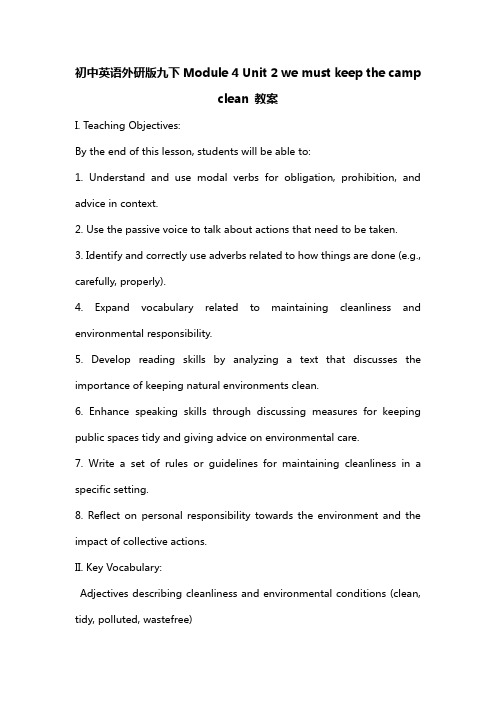
初中英语外研版九下Module 4 Unit 2 we must keep the campclean 教案I. Teaching Objectives:By the end of this lesson, students will be able to:1. Understand and use modal verbs for obligation, prohibition, and advice in context.2. Use the passive voice to talk about actions that need to be taken.3. Identify and correctly use adverbs related to how things are done (e.g., carefully, properly).4. Expand vocabulary related to maintaining cleanliness and environmental responsibility.5. Develop reading skills by analyzing a text that discusses the importance of keeping natural environments clean.6. Enhance speaking skills through discussing measures for keeping public spaces tidy and giving advice on environmental care.7. Write a set of rules or guidelines for maintaining cleanliness in a specific setting.8. Reflect on personal responsibility towards the environment and the impact of collective actions.II. Key Vocabulary:Adjectives describing cleanliness and environmental conditions (clean, tidy, polluted, wastefree)Nouns related to waste management and environmental protection (rubbish, recycling, disposal)Verbs associated with cleaning and maintenance (sweep, collect, dispose, recycle)Adverbs indicating how actions are performed (properly, carefully, thoroughly)III. Target Language Structures:Modal verbs (must, should, ought to) for expressing obligation and remendation.Passive voice to talk about actions that need to be taken by people in general ("Trash must be disposed of properly").Adverbs for adding details on how actions are carried out.IV. Teaching Aids:Images or videos showing the consequences of not keeping public spaces clean.Whiteboard and markers for grammar explanation and writing key sentences.Audio material featuring dialogues or discussions about cleanliness and environmental care.Handouts with exercises on modal verbs, passive voice, adverbs, new vocabulary, and a writing prompt for creating cleanliness guidelines. V. Teaching Procedures:Step 1: Warmup (5 minutes)Begin with a quick discussion about the importance of cleanliness in everyday life and the consequences of neglecting it.Elicit key vocabulary from students and write it on the board.Step 2: Listening (10 minutes)Play an audio track that presents scenarios where cleanliness is crucial for health and safety.After listening, ask prehension questions to check understanding of the content.Step 3: Speaking Practice (15 minutes)Students work in pairs or small groups to discuss ways they can contribute to keeping their school, munity, or campground clean. Conduct a class activity where each group shares their ideas and creates a list of suggestions for a clean environment.Step 4: Grammar Focus (10 minutes)Review the usage of modal verbs for expressing obligation and remendations.Introduce and practice the passive voice used for talking about general actions that need to be taken.Review the use of adverbs to describe how actions are performed. Step 5: Reading (10 minutes)Distribute a text discussing the importance of keeping naturalenvironments clean, guiding students through it to identify target language structures and new vocabulary.Ask students to summarize the main points and suggest additional measures for cleanliness.Step 6: Writing Task (10 minutes)Hand out worksheets with exercises on constructing sentences using modal verbs, passive voice, and adverbs.Assign a written task where students draft a set of guidelines for maintaining cleanliness in a specified setting, based on their own experience or imagination.Step 7: Homework & Review (5 minutes)Assign homework for students to plete their guidelines for cleanliness, incorporating feedback from the writing task.Review key points from the lesson through a quick quiz or verbal questioning.VI. Assessment:Evaluate students based on their participation in speaking activities, correct usage of modal verbs, passive voice, and adverbs in oral and written assignments, and pletion of homework tasks.Assess listening skills through prehension questions related to the audio content about cleanliness scenarios.Assess reading prehension through a short quiz targeting the mainpoints and details of the provided text about environmental cleanliness. Review the ability to express obligation and remendations using the learned language structures and vocabulary.。
Module+4+Unit+2 外研版九年级英语下册
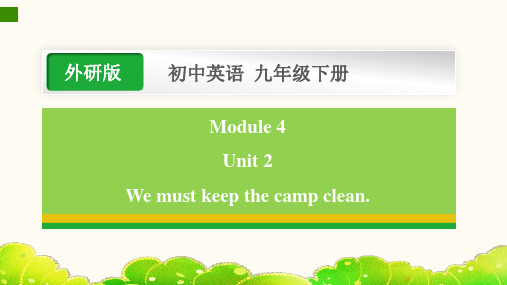
Module 4 Unit 2
We must keep the camp clean.
新课导入
Are you afraid of bears?
Can bears run very fast in the forest? Can bears climb the tree?
the 用在数词前, 表示特指。 the three of us 指的是“我们三个人” (一共就三个人); three of us指的是“我们中的三个人” (不止三个人)
队里有八个人。他们八个今晚一起吃饭。 There are eight people in the team. The eight of them will have dinner together tonight. 办公室有十个人,有八个是女的。 There are 10 people in the office and eight of them are women.
keepAour school _______. A.clean
B.cleaned
C.cleaning
D.cleans5.—Is this your coat, sir?—
No.Mine_______ over there near the window. A.hangs
B.is
hanging BC.hung
3. We soon fell asleep. fall asleep 意为“入睡;睡着”。表示动作,侧重于“自然而 然地入睡”,有时指无意之中或在不适当的场合睡着。
My father fell asleep on the sofa.我爸爸在沙发上睡着了。 辨析:be asleep;go to sleep;go to bed
外研版九下教案 Module 4 Unit 2 We must keep the camp clean
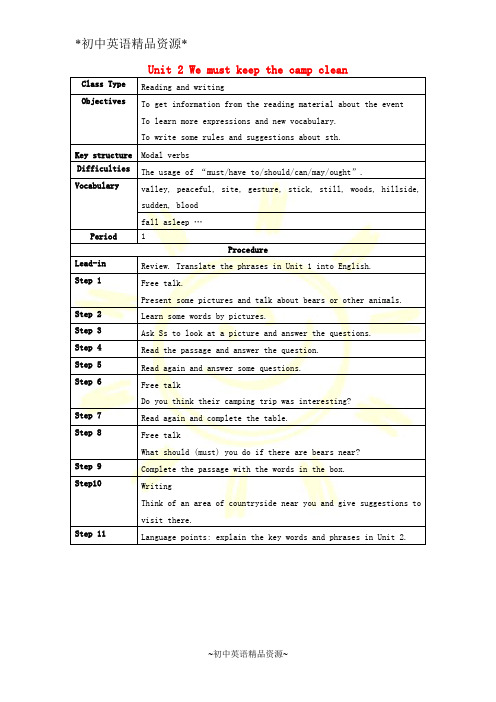
*初中英语精品资源*Class Type Reading and writingObjectives To get information from the reading material about the event To learn more expressions and new vocabulary.To write some rules and suggestions about sth.Key structure Modal verbsDifficulties The usage of “must/have to/should/can/may/ought”.Vocabulary valley, peaceful, site, gesture, stick, still, woods, hillside, sudden, bloodfall asleep …Period 1ProcedureLead-in Review. Translate the phrases in Unit 1 into English.Step 1 Free talk.Present some pictures and talk about bears or other animals. Step 2 Learn some words by pictures.Step 3 Ask Ss to look at a picture and answer the questions.Step 4 Read the passage and answer the question.Step 5 Read again and answer some questions.Step 6 Free talkDo you think their camping trip was interesting?Step 7 Read again and complete the table.Step 8 Free talkWhat should (must) you do if there are bears near?Step 9 Complete the passage with the words in the box.Step10 WritingThink of an area of countryside near you and give suggestions tovisit there.Step 11 Language points: explain the key words and phrases in Unit 2.~初中英语精品资源~。
外研版九年级英语下册《Module 4》Unit2 We must keep the camp cl
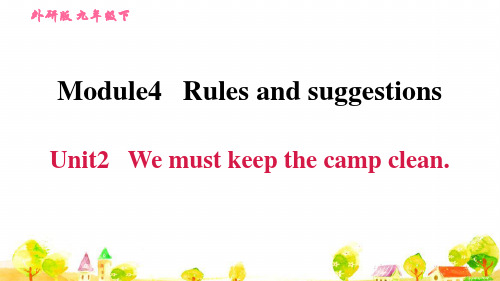
B. with
C. for
D. in
题组专训
6. More and more people in Qingdao go to work
____D____ subway now.
【中考·青岛】
A. with
B. on
C. in
D. by
题组专训
7. A lot of schools across China ___B_____ starting
外研版 九年级下
Module4 Rules and suggestions
Unit2 We must keep the camp clean.
习题链接
1 still 2 tent 3 gun 4 wood 5 blood
先练后背
提示:点击 进入习题
6 fell asleep
答案呈现
7 tidy up; move on
A. has fallen asleep
B. has been asleep
C. fell asleep
D. falls asleep
题组专训
5. You can improve your English ___A_____ listening
to English songs.
【中考·河池】
A. by
3. I showed them where the __g_u__n___ (枪) was. 4. All the furniture was made of __w_o_o_d___ (木头). 5. He lost a lot of __b_lo_o_d___ (血) in the accident.
先练后背
9. 小熊抬头看了看,向我跑过来。 The baby bear _lo_o_k__ed_ __u_p__, and ran towards me.
外研社九年级下册英语课件:Module 4 Unit 2 We must keep the camp
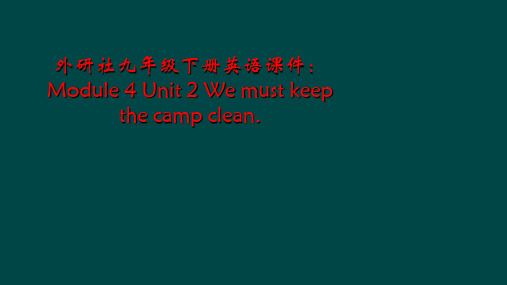
外语教学与研究出版社 九年级下册
Language points
1. … the three of us were tired after walking for about eight hours. the 用在数词前, 表示特指。 the three of us 指的是“我们三个人” (总 数就三个人); three of us指的是“ 我们中的 三个人” (总数不一定为三个人) 。
外语教学与研究出版社 九年级下册
There are eight people in the team. The eight of them will have dinner together tonight. 队里有八个人,他们八个今晚一起吃饭。 There are 10 people in the office and eight of them are women. 办公室有十个人,有八个是女的。
外语教学与研究出版社 九年级下册
Bears can climb trees. They can smell food from a distance. Bears can run fast. There are eight main types of bear: American black bears, Asian black bears, brown bears, giant pandas, Polar bears, Sloth bears, Spectacled bears and Sun bears. The largest of all bear species is the brown bear, weighing as much as 2200 pounds. Polar bears are the most skilled swimmers of all bear species.
九年级英语下册module4rulesandsuggestionsunit2wemustkeepth
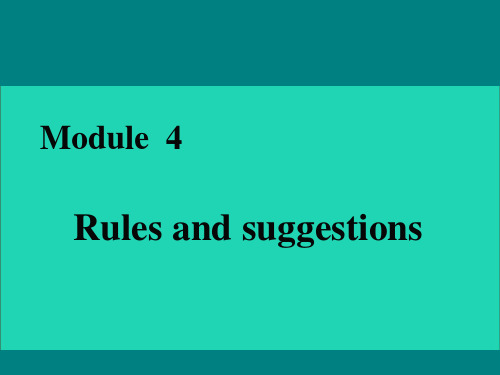
Rules and suggestions
Unit 2
4
We must keep the camp
clean.
Review
Revision
Translate the phrases into English.注意源自pay attention出发
set off
穿合适的衣服 wear proper clothes
Presentation
Read the passage and answer the question.
How much do they know about bears?
They know bears can climb trees and they know that bears can smell food from a long way away. They also know that if they see a bear, they mustn’t make sudden moves or make a sound and they mustn’t run.
山路的边缘
the edge of the hill path
伤到自己
hurt oneself
在一起; 协同一致 keep together
Review
走失;迷路 离开 独立地 一口气;一下子 注意…;留心… 引路; 带路
get lost go off on one’s own in one go be careful of lead the way
Presentation
Say where it is. Lushan National Park is in Jiangxi Province.
外研版英语九年级下册:Module 4 Unit 2 We must keep the camp c
Module 4 Rules and suggestionsUnit 2 We must keep the camp clean.学案While-readingActivity1: Find out the phrases.1. 入睡_______________________2. 在…中间____________________3.向外看______________________4. 搭起,张贴__________________5.整理________________________6. 制造噪音____________________7. 去散步_______________________8. 伸出_________________________9. 向后转_______________________ 10. 站立不动____________________ Activity 2: Complete the tablePost-readingChoose the best answer.1. When they went to sleep on the first night, they left the food _____.A. in a treeB. on the groundC. in the tentD. by a steam2. They put the food in the tree to ___.A. keep it away from the rubbishB. make it easier to open the bagC. stop the bears from smelling itD. stop the bears from seeing it3. You should make lots of noise because bears _____.A. can run faster than peopleB. may be afraid of peopleC. may not know where people areD. shouldn’t come too close to humans4. During the third night, the writer tried to go to sleep, but ________.A. was worried about the bearsB. wasn’t triedC. wanted to see the bearsD. there was too much noise5. The writer’s blood went cold because he _________.A. thought the mother bear was coming backB. was afraid of noiseC. liked bearsD. felt ill after running so fast 链接中考Choose the correct answers1. --Where are you going this month? (2013 天津)--We____ go to Xiamen, but we’re not sure.A. needn’tB. mustC. mightD. mustn’t2. Look at the “No parking” sign. You ____park your car here. (2014天津)A. shouldB. mustC. needn’tD. mustn’t3. ---Must we take out the rubbish now?---_____. You can do it after class. (2014 山东)A. Yes, you mustB. No, you can’tC. Yes, you mayD. No, you needn’t4. Here is my phone number. You ____ call me anytime you like.A. mustB. canC. shouldD. need5. ---Who’s the man over there? Is it Mr. Black?---It ____ be him. He is much taller.A. may notB. can’tC. will notD. mustn’t6. ---Whose is the dictionary?---It ____ be Alice’s. Look at her nameon the cover.A. mustB. canC. mayD. can’t7.School students _____smoke because itis against the school rules.A. needn’tB. couldn’tC. won’tD. mustn’t Complete the sentences.1. 他非常疲劳,很快就睡着了。
外研版英语九年级下册:Module 4 Unit 2 We must keep the camp c
教学设计Module4 Unit2 We must keep the calm clean. Background information:Students: 50 Junior high school students, Grade3Lesson duration: 40 minTeaching objectives:By the end of the lesson, students should be able to:nguage objectives:a)learn some key words and useful expressions;b)master the grammatical structure of the passage.2. Skill objectives:a) improve students’ reading skills;b) get specific information from the reading material about the event3. Emotional objectives: learn some survival skills----what you should do if there are bears nearTeaching contents: module4 unit2Teaching aids: blackboard, chalks, PPT, pictures, tapesType of the lesson: readingTeaching procedures:Step1: Review new words (2mins)a)Say out the meanings of the new words quickly.b)Read together.Step2: warming up (5mins)a)Show students some pictures with questions to introduce the topic.b)Have a discussion: “What can you see in this picture?”c)Look at the picture and answer two questions:1. What is the bear doing?2. What do you think the people in the tent should do?Step3: Pre-reading. (10mins)Read the passage fast and answer the questions.1. Where do you think is the best place to keep food safe from bears?2. What was the noise behind the writer?3. Do you think their camping trip was interesting?Step4: While-reading (10mins)a) Read carefully and complete the table.b) Check true or false.c) Write notes about the things you must do if there are bears near. Step5: Post-reading (10mins)a)Retell the passage.In the middle of the first night, ...During the second night, ...On the fourth day, ...b) Talk about an area in your hometown with your partner.Where is it?Why do people go there?Are there any dangers from animals? How can we protect ourselves? Step6: ConclusionHomework:1. Review the language points in unit2.2. Complete Activity 4 in Page29.。
外研版(新标准)英语九年级下册M4 Unit 2 We must keep the camp clean教学设计
Module 4 Unit 2We must keep the camp clean.教案设计学习重点:重点单词:valley, peaceful, site, gesture...重点短语:watch out, fall asleep, reach out重点句子:We fell asleep listening to the sound of water...学习难点:熟练、准确地运用本单元所学的单词、短语及句型结构。
教学准备:1、在百度中搜索本课资料2、录音机、录音带,多媒体教学方法:问题式导学法、分层次教学法、任务型教学法等。
四、教学过程I、导入新课1.Why must we keep the camp clean?➢To protect the environment.➢To help keep the bears away from us. (Play a video to show the reason)2.Bears are dangerous animals, have you ever got a close contact with them? Three young men went to the Yellowstone Park in America for camping. And they met bears, let’s see what happened.II、Fast readingRead the passage and finish the tasks.1.Who got a close contact with the bears?_________________________________________.2.Devide the passage into four parts according to the timeline.III、Careful reading1.Read the first part and finish the tasks.1).What did they do on the first evening ?2).What did they hear and see in the middle night?2.Read the second part and finish the tasks.1)Complete the table.What happened What they should do or shouldn’t doIn the middle of the first night, they_______________ outside. And the bagof food ________They should _____________________During the second night, the bears______________ and ______________from the tree.They should ____________________________and ________________________________________________________2)After reading this part, try to find how much the three man know about the bears.。
九年级英语下册Module4Unit2Wemustkeepthecampclean教案新版外研版
Unit 2 We must keep the camp clean.【教学目标】●Knowledge objectiveKey vocabulary—tent, fall, hang, sudden, gun, soft, still, wood, blood Key structures—fall asleep●Ability objectiveTo get information about the outside camping.●Moral objectiveTo know more about other life rules and protect ourselves better.【教学重点】To learn some rules and suggestions in the passage.【教学难点】To get information from the article.【教学方法】PWP method, task-based method【教学手段】A tape recorder, multimedia and some pictures【教学过程】Teaching ProceduresStep 1 Lead-inLook at the pictures and answer the questions.Are you afraid of bears?Can bears run very fast in the forest?Can bears climb the tree?Can they smell food from far away?What should we do when we meet a bear?Step 2 Consolidate new words and expressionsLook and say. The teacher shows the pictures of new words or expressions and let the students to say as quickly as possible.tent n. 帐篷fall v. 摔倒hang v. 悬挂sudden adj. 突然的gun n. 枪soft adj. 软的still adj. 静止的;不动的wood n. 树林blood n. 血;血液fall asleep 入睡;睡着Step 3 Pre-readingLook at the picture and answer the questions.1. What is the bear doing?2. What do you think the people in the tent should do?Step 4 ListeningListen to Part 2 and answer the questions.1. What did they feel after walking for about eight hours?2. Who opened the bag of food?Keys: They were tired.The bear.Step 5 Reading1. Read the passage and answer the questions.1) Where do you think is the best place to keep food safe from bears?2) What was the noise behind the writer?3) Do you think their camping trip was interesting?2. Read the passage and complete the table.What happened What they should or should not do In the middle of the first night, thewriter heard a _____________ outside. Andthe bag of food ___________.They should ____________________.During the second night, the bears came again and ___________ from the tree. They should _________________ and ________________.On the fourth day, the writer saw _____________________________________________. Then _________ came. He should not ____________________ _________________________________.3. Complete the passages with the words in the boxblood gun sticks suddenOn the third day of our camping trip, Ben told us that if we saw a bear, we should not make any (1) _______ moves. We did not have a (2) _______ to keep ourselves safe. The next day, I saw a baby bear playing with some (3) ________ and stones.His mother arrived soon, and I was so afraid that my (4) _______ went cold. I did not move until the bears walked away. Then I ran back to my friends as fast as I could.Keys: sudden gun sticks bloodRead the passage and fill in the blanks according to the passage.Step 6 Language pointsTo learn about the main points in the passage.1. On the first evening, the three of us were tired after walking for about eighthours.on the first evening表示“在第一个晚上”,当表示具体某一天的早上、中午或晚上是,要用介词on。
- 1、下载文档前请自行甄别文档内容的完整性,平台不提供额外的编辑、内容补充、找答案等附加服务。
- 2、"仅部分预览"的文档,不可在线预览部分如存在完整性等问题,可反馈申请退款(可完整预览的文档不适用该条件!)。
- 3、如文档侵犯您的权益,请联系客服反馈,我们会尽快为您处理(人工客服工作时间:9:00-18:30)。
Unit 2 You must keep the camp clean(一)重点单词1. hang v.(hung,hung) 悬挂,吊hang一般指把某物悬挂在高处或线上,由此下垂并能够摆动;hang还可作“吊死,绞死”解。
如:I’ll hang the pictures as high as I can.我将尽可能把这些画挂得高。
(二)常考短语1. watch out 当心,提放2. fall asleep 入睡,睡着【辨析】go to bed, go to sleep, fall asleep, get to sleep(1)sleep强调“睡觉”这一动作,是延续性动词,可与表示时间段的状语连用。
如:Did you sleep well last night?昨晚你睡得好吗?(2)go/get to sleep指“睡着、入睡”。
go to sleep强调“入睡”这个动作。
如: He was so tired that he went to sleep soon. 他很累,不久就睡着了。
(3)fall asleep与go /g et to sleep同义,但fall asleep侧重“无意识地入睡、不想入睡而入睡”的含义。
如:He was just falling asleep when there was a loud knock at the door.他刚睡着,就有人使劲敲门。
(4)be asleep表示“睡着”的状态。
如: The baby is fast asleep.孩子睡得很香。
(5)go to bed意为“就寝、上床睡觉”,着重指上床准备睡觉的动作。
一般说来,是go to bed在前,然后才go /get to sleep或fall asleep。
如: He usually goes to bed at ten o’clock and goes to sleep /falls asleep five min utes afterwards.他通常十点钟就寝,五分种后入睡。
Ⅰ.根据句意及所给汉语提示,完成下列单词。
1. The wounded man was covered with (血迹).2. Would you like some wine or something (软的)?3. I’ve been wondering where to (挂) my new picture.4. Befor e it get dark the camper put up their (帐篷) in a field.5. The boy jumped up in surprise at the (突然的) noise.Ⅱ.根据所给汉语完成下列句子,每空一词。
1. 小心! 汽车来了。
______ ______! There's a car coming.2. 他们在树林边缘搭起帐篷。
They ______ ______ tents on the fringes of the woods.3. 留下他孤苦伶仃一个人,没人照顾。
He was left alone, with ______ ______ to look after him.4. 一些人伸出手去触摸这些名字。
Some ______ ______ and touch the name.5. 我看到她朝银行走去。
I ______ ______ ______ ______ the bank.Ⅲ.口语运用。
A: You must be really excited about leaving for America tomorrow, Li Ping!B: Yeah. (1)A: Nervous about what?B: I don’t know many of the customs and manners in the USA. (2)A: Sure.B: (3)A: Well, it’s important to be on time when you’re invited for dinner. (4) Americans expect their guests to be on time.B: Then how long may I stay there?A: (5) Or you seem to have come only for the meal. When your friends seemto be getting tired and running out of thin gs, it’s time to leave. The next day, call or write a thank-you note to say how much you enjoyed the evening.2. in the middle of在……中间3. look out of 从……向外看4. put up 建造,张贴5. tidy up 整理,收拾6. make noise 制造噪音7. above all 除了上面的(三)核心句型1. The baby bear looked up, and ran towards me.熊宝宝抬起头,向我跑过来。
(1)look up 仰视;看望;查阅代词作宾语时要放在look和up之间。
如:The girl was so short that she had to look up to her younger sister.小女孩个子太矮,只好仰着头看她的妹妹。
(2)towards是介词,意为“往,向;朝……方向”。
如:They drove towards the beach. 他们驾车朝海滩开去。
I saw her walking towar ds the bank. 我看到她朝银行走去。
【拓展】介词to的用法归纳① (表示时间)到, 直到, 在……到来之前, 离……He wrote from morning to night. 他从早到晚写东西。
② (表示方向)朝, 往, 通向He turned to his companion before he replied. 他转身朝向他的伙伴然后回答。
③(表示状态)紧贴着, 紧靠着, 对着The two lovers danced cheek to cheek. 那对情侣脸贴着脸跳舞。
④(表示对象)对, 对于, 对……来说What will Doris say to it? 对此事多丽丝将怎么说呢?⑤(表示方位)在……方向[方位], 处于……顺序Scotland is to the north of England. 苏格兰在英格兰之北。
Ⅳ.单项填空。
( ) 1. —Her house is near a factory.—Oh, it ______ be very noisy.A. needB. can’tC. must( ) 2. ______ went hiking last weekend because of the bad weather.A. SomeoneB. No oneC. Everyone( ) 3. —Must I return the book this week?— No, you ______. You can ______ it for 20 days.A. mustn’t; keepB. needn’t; borrowC. needn’t; keep( ) 4.—Can you go to see a film with us this evening?—Sorry, I can’t. I _____ take care of my little brother at home because my mother is ill.A. have toB. mayC. would( ) 5. When I walked past the park, I saw s ome old people _____ Chinese Taiji.A. doB. didC. doingⅤ.完形填空。
Latchkey KidsAre you home only yourself after school? No one knows how many 1 are home after school and no parents at home, but they know the 2 is in the millions(百万). Kids who take care of themselves are sometimes 3 “latchkey” kids.This nickname got its start in the 1940s, 4 World War II. The men were away at war, so man y women had to take jobs in factories to 5 the country going.With both parents away, lots of kids went back to a 6 man’s home after school. Latchkey kids wore a house key around their 7 and this key opened the front door or latch.Today, it’s common for 8 parents to work or for kids to live with just one parent, so a new group of kids is spending 9 no one with them after school. Many schools now have after-school activities, 10 some don’t, and in some cases, families may not be able to pay for the more money.( ) 1. A. parents B. teachers C. kids( ) 2. A. number B. people C. teenagers( ) 3. A. made B. gave C. called( ) 4. A. before B. during C. after( ) 5. A. keep B. make C. let( ) 6. A. few B. little C. no( ) 7. A. necks B. armies C. legs( ) 8. A. all B. both C. some( ) 9. A. sometime B. sometimes C. some time( ) 10. A. but B. and C. or(一)重点单词1. still adj. 静止的,柔软的The room was still at the end of the speech.演讲结束的时候,房间里寂静无声。
